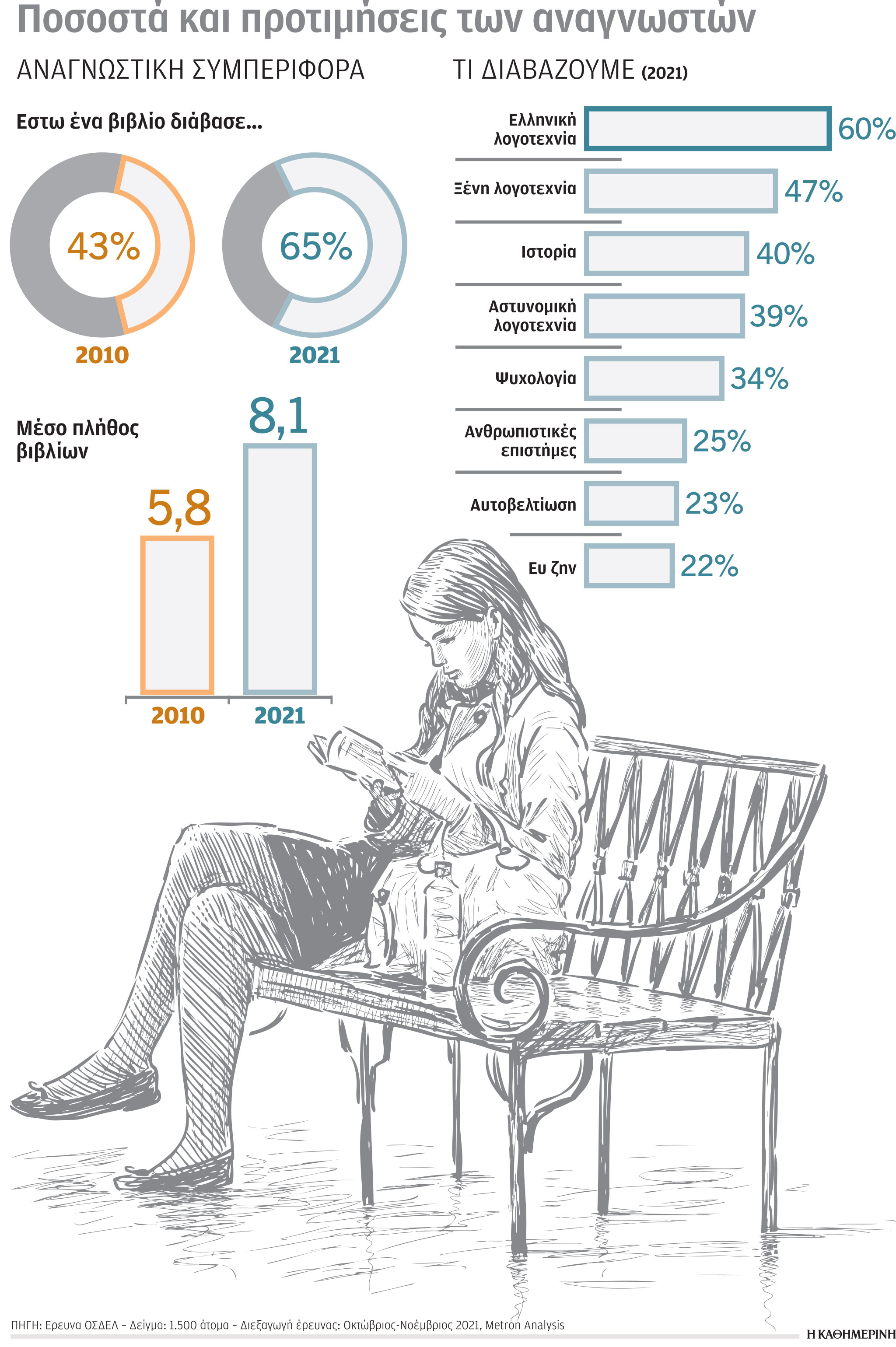
How much, what and mainly because of what factors people read today books Greek readers? Is the practice of reading something like an individual gift, or does it depend on social determinants? And if there is a need to democratize reading, what should the national book policy be guided by? These are some of the questions in a recent study entitled “Readings, Readers: The Book and Its Audience in Greece”, initiated and funded by Organization for Collective Management of Speech Projects (OSDEL) by Metron Analysis and was conducted under the scientific supervision of Nikos Panagiotopoulos, professor of sociology at the University of Athens.
An investigation, the first to be carried out after his colleague National Book Center (EKEBI) in 2010, was presented yesterday, and its first notable conclusion is that if the Greek population is divided into three parts according to the number of books read in the last year, then those who have not read a single book make up 35% – a third -. while 34% and 31% separate non-intensive and intensive readers. At the top of the preferences we find Greek and foreign literature, history and detective stories, while an important criterion for buying a book is word of mouth and then physical contact with the product in a bookstore. Reading seeks information, aesthetic pleasure and an escape from everyday life, expectations that are achieved with printed books in percentages exceeding 80% compared to 15% of e-books. And although the main reason that prevents most people from reading is lack of time, for non-readers it is that they are not attracted to the practice of reading itself. However, compared to 2010, we read a little more: in 2010, 43% of the population read at least one book, and in 2021 this percentage has increased to 65%.
The most important question
Why, after the eradication of illiteracy in Greek society, most of it does not read, was a key research question. And the findings of the group led by Mr. Panagiotopoulos were the result of a focus on what the French sociologist Pierre Bourdieu defined as the “cultural capital” of the individual. In particular, according to research, the higher the educational level of the participants, the higher their “scores” on the so-called “book reading index”. In addition, the higher the occupation (but also the reading activity) of the father, mother, and grandparents of the respondents, the higher their own reading index turns out to be – the same is the case with a large number of books in the household of the respondents during their childhood. In general, the higher the socioeconomic class of a household, the more books its respondents read. “And if we had to say in one sentence what is observed,” Mr. Panagiotopoulos said, “is that cultural capital is going towards cultural capital.”
According to studies, the main reason that prevents most people from reading is lack of time.
If, of course, social and cultural inequalities produce corresponding indications, which, in turn, are reflected in the former, the question arises how this vicious circle will be broken. In his speech, Professor Nikos Panagiotopoulos, emphasizing that indeed the practice of reading is in contact with every skill, every communication and every effectiveness of the individual (therefore its dissemination contributes to individual and collective socio-economic development), then emphasized that in order for reading to be democratized , one should take into account not only the fact that extensive and fast reading is unevenly distributed between social strata, but also the fact that certain social groups are guided by different values, if not outright devaluing reading.
Given these as facts, realistic efforts to democratize reading should, among other things, inform the relevant authorities that the spread of such cultural practices is not only an issue of book availability: the love of reading needs a foundation and support. meaning associated with the culture of a group or individual. For its part, the education system must be able to break the vicious circle of “cultural deprivation” experienced by the poorest sections of the population. And instead of taking an aristocratic, privileged position, every body concerned, Mr. Panagiotopoulos emphasized, should take into account the basic principle: “there are no unsuitable books or useless and unsuitable readings, even if they are “easy” and first-class.” .
Detailed findings will be published in the book Gutenberg Publications, which will be available at a related event hosted by OSDEL to the public on Tuesday, November 8 at 7:00 pm at the Athens Conservatory.
Source: Kathimerini
James Springer is a renowned author and opinion writer, known for his bold and thought-provoking articles on a wide range of topics. He currently works as a writer at 247 news reel, where he uses his unique voice and sharp wit to offer fresh perspectives on current events. His articles are widely read and shared and has earned him a reputation as a talented and insightful writer.